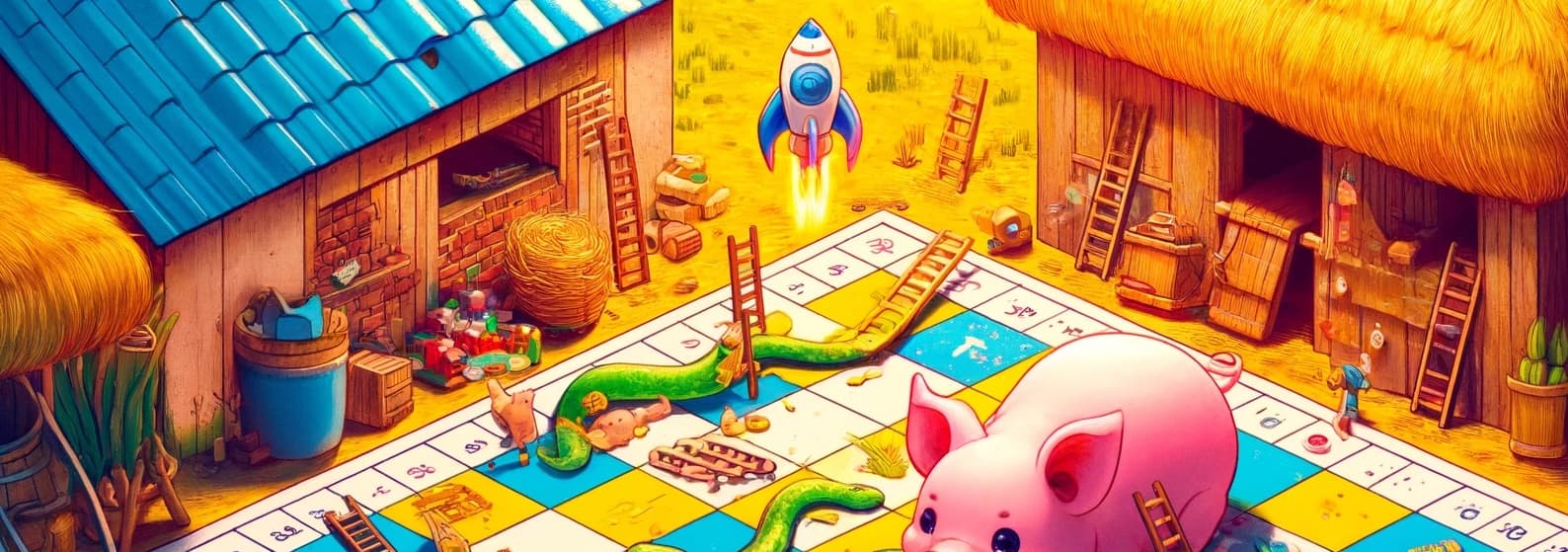
3 Playful Retrospective Examples Your Remote Team Will Love

Among Agile ceremonies, retrospective meetings stand out because they are pivotal in fostering continuous improvement within teams. However, conducting engaging retrospectives can pose a unique challenge for remote teams.
This blog explores three playful retrospective templates that remote Agile teams will love, offering a refreshing approach to reflection and improvement.
Why Playful Retrospective Examples?
Retrospectives are not just about identifying what went well and what didn't. They're also about fostering collaboration, creativity, and team cohesion. Playful retrospective examples inject a sense of fun and excitement into the process, making it more engaging and effective, especially in remote settings where team members may feel disconnected. A fun, team-bonding activity encourages engagement and constructive discussions where everyone feels included.
1. The 3 Little Pigs Retrospective
Imagine reflecting on your sprint or project through the lens of the classic tale of the three little pigs. This retrospective template offers a whimsical approach to retrospectives, encouraging teams to explore different aspects of their work using the metaphor of the three little pigs' houses. By relating the metaphor to real-world scenarios, teams can uncover valuable insights and actionable takeaways for improvement.
How to Implement the 3 Little Pigs Retrospective
To conduct the 3 Little Pigs Retrospective, follow these steps:
Divide the retrospective into three sections, each representing one of the pigs' houses: straw, sticks, and bricks.
Encourage team members to reflect on what aspects of the sprint or project were like each type of house: fragile and collapsing (straw), sturdy but vulnerable (sticks), or robust and resilient (bricks).
Discuss how the team can build more stability pillars into their future work to improve resilience and sustainability.
Expert Tips for Successful Retrospective Examples
To make the 3 Little Pigs retrospective impactful, keep in mind the following:
Encourage Participation: Create a safe space where everyone feels comfortable sharing challenges and successes. Start by having each member share a "straw" and "brick" moment, setting the stage for open dialogue.
Prioritize Actionable Insights: Identify specific actions to improve based on the discussion. Brainstorm actionable items and prioritize them based on impact and feasibility to create a clear plan for positive changes.
Promote Open Communication: Promote constructive dialogue and feedback among team members. Use structured exercises like a "feedback circle" to encourage mutual respect and trust, ensuring everyone's voice is heard and valued.
2. Space and Rockets Retrospective
For the rocket-savvy or space-interested team, the Space and Rockets Retrospective offers a captivating alternative. This retrospective example allows teams to visualize their progress and setbacks in the form of rockets flying through space, creating a visually stimulating representation of their journey.
How to Implement the Space and Rockets Activity
Conduct the Space and Rockets Retrospective by following these steps:
Assign the team the role of a space rocket preparing for launch.
Invite team members to contribute notes to two designated columns: Malfunctions and Thrusters.
In the Malfunctions column, identify aspects hindering progress that require improvement. Examples may include inefficient processes or communication barriers.
In the Thrusters column, highlight effective strategies and collaboration propelling the team towards its goals.
Encourage recognition of successful initiatives and positive developments.
Visualize these aspects on a shared board or digital platform.
Gain insights into areas requiring attention and strengths to leverage for future success.
Expert Tips for Successful Retrospective Examples
Encourage active participation from all team members by assigning each one a role for preparing the space rocket launch. This role-playing approach strengthens engagement and helps team members empathize with the team's journey and contribute insights effectively.
Prioritize Actionable Insights: Guide the retrospective towards actionable insights by discussing the identified malfunctions and thrusters. Encourage team members to explore the root causes of malfunctions and celebrate the successful initiatives contributing as thrusters. Actionable insights can ensure a retrospective that leads to concrete plans for improvement and drives meaningful change within the team.
Utilize Visual Representation: Make things visual to enhance understanding and facilitate discussion. Create a shared board or digital platform where team members can visualize malfunctions and thrusters. This visualization helps convey complex concepts and provides a clear overview of areas requiring attention and strengths to leverage for future success.
3. Snakes and Ladders Retrospective
Who doesn't love a good board game? Remember spending hours at a friend's house playing Snakes and Ladders? Bring the nostalgia of the classics to your Retrospective with the Snakes and Ladders template. This gamified approach encourages teams to identify obstacles (snakes) and opportunities (ladders) encountered during the sprint, fostering a spirit of celebration and learning.
How to Implement the Snakes and Ladders Template
To conduct the Snakes and Ladders Retrospective, follow these steps:
Set up a board game format with squares representing different stages or tasks in the sprint.
Designate snakes to represent setbacks or challenges that may be hindering your progress and ladders to represent opportunities that can get the team closer to your goal.
Invite team members to reflect on their journey through the sprint, discussing the highs and lows encountered along the way.
Expert Tips for Successful Retrospective Examples
Encourage Active Engagement: Foster an environment where all team members feel empowered to participate actively in the "Snakes and Ladders" retrospective. Create a safe space for open dialogue, ensuring everyone's voice is heard and valued. By encouraging active engagement, you can uncover diverse perspectives and insights that lead to more meaningful discussions and outcomes.
Focus on Actionable Insights: Guide the team to identify actionable insights during the Retrospective. Encourage discussions that go deeper into the root causes of both setbacks (snakes) and opportunities (ladders). By focusing on actionable insights, you can develop concrete improvement plans that drive real change within the team.
Facilitate Collaborative Problem-Solving: Promote collaborative problem-solving throughout the retrospective activity. Encourage team members to brainstorm solutions for addressing identified challenges and capitalizing on opportunities. By fostering a collaborative approach, you can use the team's collective expertise and creativity to drive continuous improvement and success.
5 Expert Tips and Tricks for Successful Retrospective Meetings
In addition to the specific retrospective examples outlined above, here are some general tips for conducting engaging and effective retrospectives in remote teams:
Create a supportive environment that encourages open discussion and constructive feedback. Emphasize the importance of participation and inclusivity, ensuring all team members have a voice and feel valued.
Incorporate icebreakers or team-building activities at the beginning of the retrospective to set a positive tone and build rapport among team members.
Celebrate successes and achievements, no matter how small, to reinforce positive behavior and boost team morale.
Facilitate discussions around each stage of the Agile ceremonies, encouraging team members to share their perspectives and insights.
Experiment with different retrospective templates and activities to keep things fresh and engaging for team members.
Takeaway
Remote Agile teams can inject creativity, engagement, and fun into their continuous improvement process by incorporating playful elements into their retrospectives. Whether reflecting on the trials and triumphs of the three little pigs, charting their progress through space and rockets, or navigating the ups and downs of snakes and ladders, these playful retrospective examples offer a refreshing approach to reflection and improvement.
As teams embrace these retrospective examples and adapt them to their unique needs and preferences, they'll discover new ways to collaborate, innovate, and thrive in the remote Agile environment.
Try out the retrospective examples mentioned on our website and boost your efficiency with Team O'Clock.








